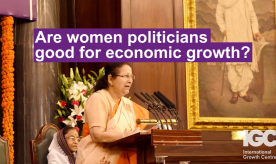Female politicians and economic growth: Evidence from state elections in India
- The project studies close elections between men and women for election to India's state legislative assemblies. It finds significantly higher growth in economic activity in constituencies that elect women.
- Given average GDP growth in India of about 7% per year (during the study period), the researchers estimate the growth premium for constituencies from having a female legislator is about 25%.
- The researchers also find evidence that women legislators are less likely to be criminal and corrupt, more efficient at completing projects, and less vulnerable to political opportunism.
Experimental research suggests that women are more likely to be fair and altruistic and political economy research shows that women are more likely than men to favour redistribution and to implement pro-woman or pro-child policies.These results raise the potential concern that economic growth suffers under women legislators. Our research provides the first attempt to investigate this as a causal relationship.
We study close elections between men and women for election to India's state legislative assemblies, as the identity of the winner in a close election is quasi-random. In this sample, we find that economic growth is higher in constituencies led by women than in constituencies led by men. Investigating mechanisms, we find that women are less likely to have a criminal record, less likely to accumulate rents in office, more likely to oversee road completion and less likely to be politically opportunistic in their allocation of effort. Our findings are consistent with women being less likely to be corrupt, less willing to take risks and more patient than men, differences in personality traits that suggest some external validity of our results.
This is the first study to show, using plausibly causal identification, that women legislators can increase economic growth. The results are relevant to topical debates in India and in other countries on introducing political quotas for women. To the extent that opportunities for corruption are more prevalent in developing countries, women may perform especially well relative to men in developing countries.Our research is also relevant to the wider question of what policies can raise economic growth.
Although the differences we identify are between men and women who contest against the other gender in close electoral races, if we compare women with men who win or lose against women by a larger victory margin, economic performance appears similar between constitutencies led by women vs men -- there is no evidence that men are better at delivering economic growth.
Several other studies have shown that women in political office make different policy choices than men. It is never quite clear what the tradeoffs are. Our study is relevant insofar as it suggests that there is no clear economic cost to raising the share of women in politics.







